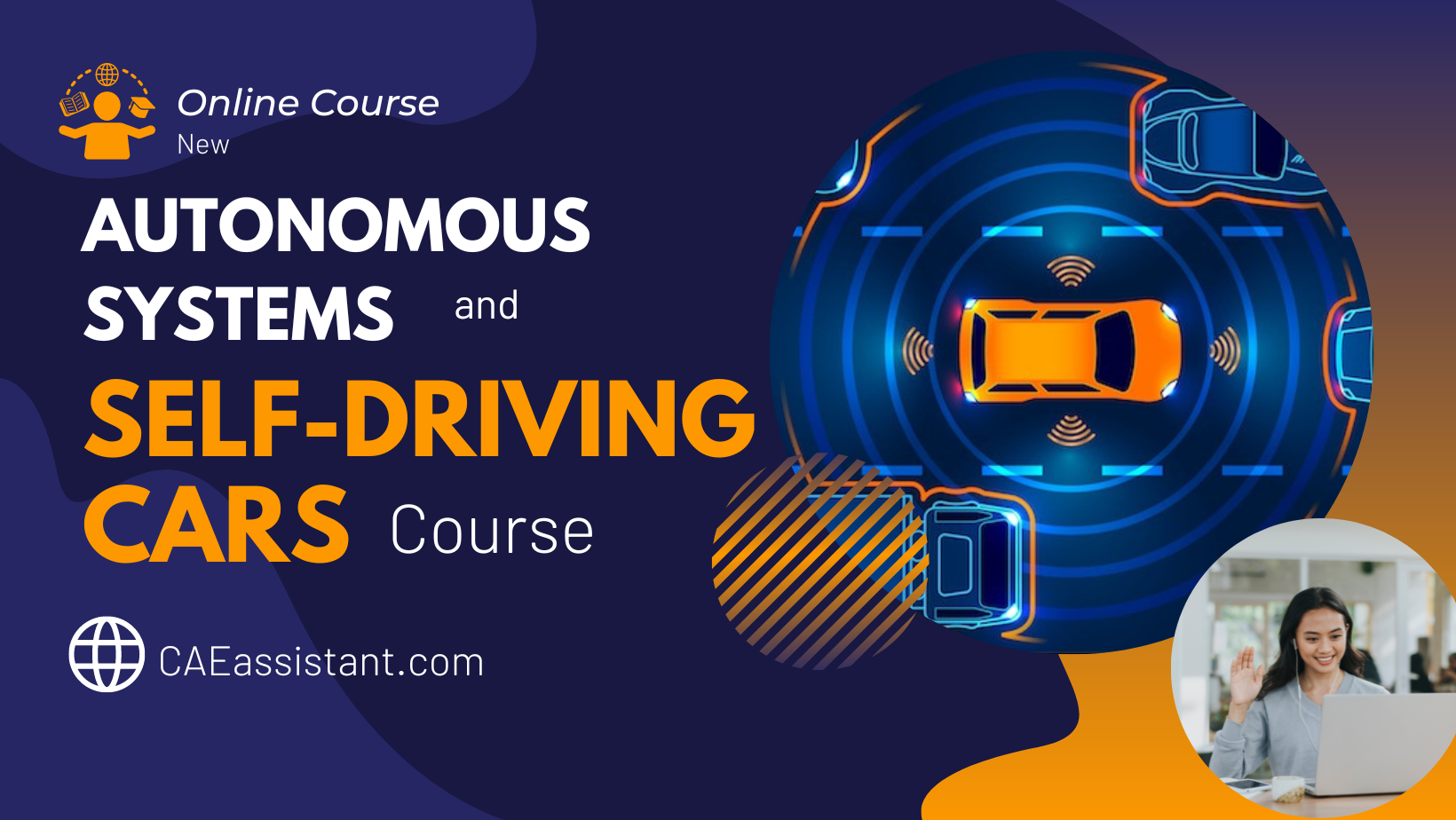Blog
Autonomous Systems Course and Self-Driving Cars
Autonomous Systems Course Overview
The Autonomous Systems course provides a comprehensive introduction to autonomous systems, focusing specifically on self-driving cars. Participants will explore key aspects of autonomous vehicle technology, including automotive engineering, sensor fusion, computer vision, and deep learning. The course blends theoretical foundations with hands-on programming tasks, using popular frameworks such as Python, ROS (Robot Operating System), and industry-relevant tools for autonomous driving. By the end of this course, participants will understand how autonomous vehicles navigate environments, make decisions, and ensure safety in complex driving conditions.
Autonomous Systems Course Objectives
The course aims to:
- Provide participants with a solid foundation in the fundamentals of autonomous systems, particularly as they apply to automotive engineering.
- Teach essential algorithms and models used in self-driving cars, including perception, localization, control, and path planning.
- Equip participants with hands-on programming experience using deep learning, computer vision, and sensor fusion technologies.
- Develop an understanding of the ethical, legal, and safety considerations surrounding autonomous vehicles.
Learning Outcomes | Self-Driving Cars
By the end of the course, participants will:
- Understand the core concepts and challenges in designing autonomous systems, particularly for self-driving cars.
- Gain hands-on experience in developing and testing algorithms for perception, decision-making, and control.
- Be able to integrate various technologies, including deep learning, computer vision, and sensor fusion, into an autonomous driving system.
- Understand the ethical, legal, and safety implications of autonomous vehicles, preparing them to engage with ongoing debates in the field.
- Be prepared to work on autonomous vehicle projects in both academia and industry.
Conclusion
This Autonomous Systems and Self-Driving Cars course provides a holistic introduction to one of the most cutting-edge areas of automotive engineering and AI. Through a combination of theory, hands-on practice, and real-world case studies, participants will be equipped to contribute to the rapidly evolving field of autonomous vehicles.
You can find more info and references via this link: https://www.sciencedirect.com/search?qs=autonomous%20systems
- Overview of autonomous systems in various industries, with a focus on the automotive sector.
- Key components of self-driving cars: sensors, actuators, and decision-making algorithms.
- Introduction to ROS and its role in autonomous systems development.
- Vehicle dynamics and control systems for autonomous cars.
- Key automotive components involved in autonomous driving: engine control, braking systems, and steering mechanisms.
- Real-time systems and embedded software for vehicle automation.
- Overview of sensors used in autonomous vehicles: LiDAR, radar, cameras, and ultrasonic sensors.
- Techniques for fusing data from multiple sensors to create a coherent view of the environment.
- Introduction to Kalman filtering and its advanced variants for sensor fusion.
- Basics of deep learning and its applications in object detection, classification, and tracking.
- Implementing convolutional neural networks (CNNs) for vehicle and pedestrian detection.
- Lane detection, road segmentation, and scene understanding using computer vision techniques.
- Introduction to SLAM (Simultaneous Localization and Mapping) and its importance in autonomous navigation.
- GPS, inertial measurement units (IMUs), and wheel odometry for vehicle localization.
- Advanced techniques like particle filters and graph-based SLAM.
- Path planning algorithms: Dijkstra’s, A*, and Rapidly-exploring Random Trees (RRT).
- Motion planning in dynamic environments and obstacle avoidance.
- Control systems for autonomous driving: PID control, Model Predictive Control (MPC).
- Legal frameworks and regulations for autonomous vehicles.
- Ethical considerations: decision-making in life-critical situations, privacy, and data security.
- Safety standards and testing protocols for autonomous driving systems.
- Real-world applications of autonomous systems in logistics, transportation, and smart cities.
- Final project: Designing and implementing a simple autonomous driving system using Python and ROS.
- Case studies on industry leaders like Tesla, Waymo, and Nvidia in the field of autonomous vehicles.
Our team of CAE Assistant instructors, renowned experts in their respective domains, will deliver each section of the course, providing you with unparalleled knowledge and insights.
Currently, the course instructor is being finalized, but we are committed to bringing you one of the leading experts in the field. We’re working diligently to ensure that a top researcher will be selected to develop and deliver this course soon.
Our courses are designed for a diverse audience that includes graduate and PhD students, R&D professionals in industry, and university faculty members. Each course is meticulously crafted based on the latest ISI papers and cutting-edge research to ensure that participants receive the most current and relevant knowledge in emerging technology topics.
Graduate and PhD Students: These courses provide advanced insights and practical applications of recent research, equipping students with the latest knowledge and methodologies to enhance their academic work and research capabilities.
R&D Employees: For professionals working in industrial research and development, our courses offer valuable updates on new trends and technologies, fostering innovation and enhancing their ability to address complex challenges in their projects.
University Faculty Members: Academics seeking to stay abreast of the latest developments will benefit from our courses by gaining access to cutting-edge research and emerging technologies, which can be integrated into their teaching and research activities.
By participating in our courses, all these groups will gain a competitive edge through up-to-date knowledge, practical skills, and insights directly derived from the forefront of scientific and technological advancements.
Finite Element Analysis course Certificate
Upon successful completion of this course, you will receive a course completion certificate. This certificate guarantees your skills with the amount of time spent, skills trained, and can be verified online.

This course is ideal for:
- Engineers and computer scientists interested in pursuing careers in autonomous vehicle development.
- Automotive engineers who wish to deepen their knowledge of autonomous systems.
- Data scientists and AI enthusiasts eager to apply deep learning and computer vision to real-world problems.
- Graduate students or professionals in robotics and artificial intelligence looking to expand their expertise in self-driving technologies.
First Session for Free!



